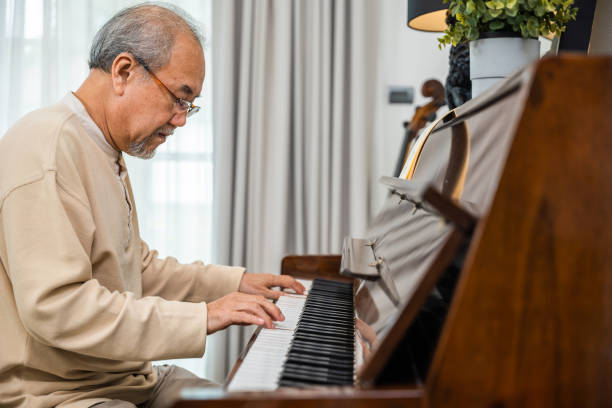Music Helps Seniors Stay Healthy
It has been said that music is good for the soul. That may be true, but according to medical research, it is also good for your health. Numerous studies into the link between music and health all conclude that music has a positive impact on a broad range of physical and psychological conditions, and particularly so for seniors.
Music For A Better Body And Mind
A recent study at Exeter University that spanned ten years and involved 25,000 people reported that playing a musical instrument or singing can boost the brain health of older adults. Scientists who investigated the mental processes associated with brain health said that seniors who engaged in music showed marked improvements in core mental functions such as focusing, remembering, and performing multiple tasks. Their findings show that musicality in a person’s latter years enables mental exercises that improve the brain’s agility and resilience.
Playing a musical instrument, particularly the piano, was found to result in marked improvements in cognitive health. While singing in choirs or choral groups was also reported to render similar benefits, researchers suggest that the social aspect of being in a musical group may contribute as much if not more to the positive changes in mental health. Regardless of the reasons why or how older adults engage in music, researchers conclude it makes them healthier physically and mentally while also improving their overall quality of life.
How Music Improves Health
Some of the other benefits that seniors enjoy when making music part of their life include:
• Music is a heart healthy activity because it can reduce heart rate and lower blood pressure.
• Music reduces stress and anxiety. It lowers levels of stress hormones and elevates happy hormones such as serotonin, endorphin, and dopamine which can relieve feelings of depression.
• Music stimulates memories. It cannot cure Alzheimer’s or dementia, but music therapy can help minimize some of the symptoms associated with each, including calming down agitated patients, improving moods, and enabling better communications with caregivers.
• Music can help manage and ease pain. Music lowers stress and is a powerful stimulus that can effectively compete with pain signals sent to the brain. In geriatric, intensive, and palliative care, music has been shown to minimize the perceived intensity level of pain.
• Music is an individual and social activity. People who enjoy playing a musical instrument or singing can do so whether they are alone or part of a group. For individuals living alone, it combats feelings of isolation and boredom. For those who participate in group musical activities, it gives them a positive sense of purpose that elevates their overall sense of well-being.
• Music boosts energy levels. Playing, singing, or dancing to music can improve cardio and pulmonary health because it requires being active physically.
Embrace the Power of Music
There is an intrinsic healing power to music. It can lift us up emotionally. It can inspire wonderful memories by helping us recall the soundtracks of our lives. Music is a powerful medicine that is particularly impactful as we age because it can comfort pains no drug can reach.
Keep music a part of your life because it is the ultimate comfort food for your body and soul.


Leave a Reply
You must be logged in to post a comment.